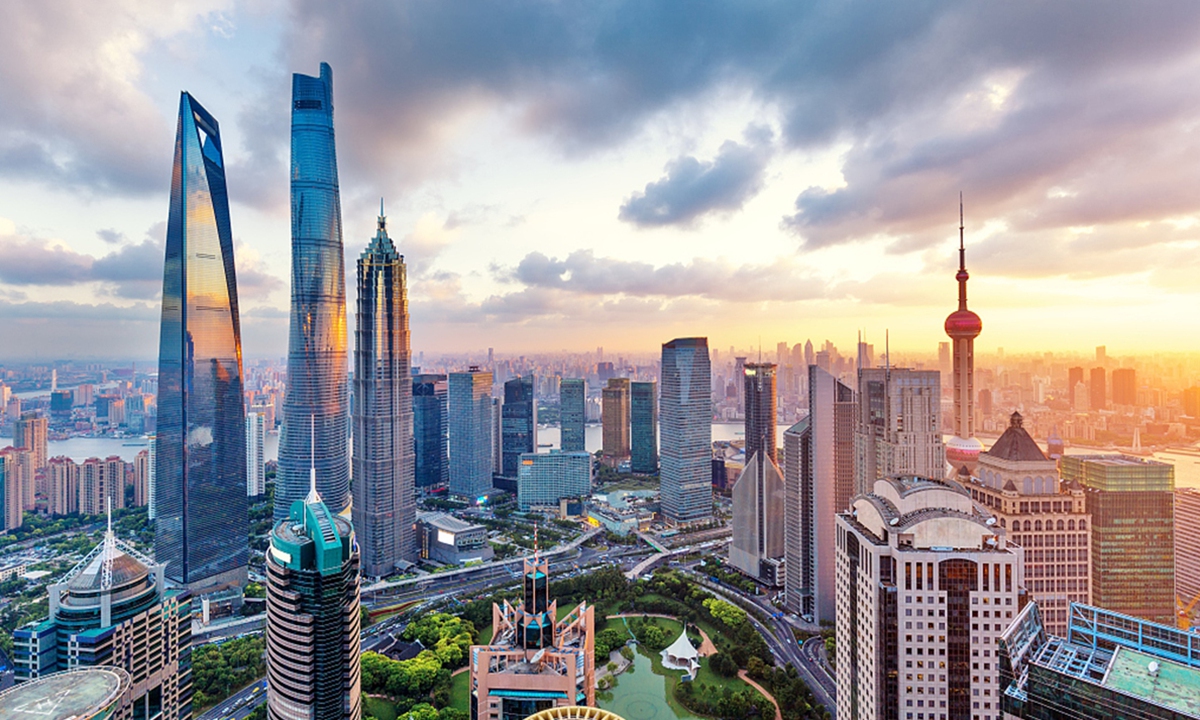
Photo:VCG
The so-called Chinese economic collapse theory has been resurfacing in Western public opinion lately. Interestingly, while these people try their best to badmouth China's current economy, they acknowledge the performance and achievements of China's economy in the past, creating a comparison in which they revere the past and neglect the present. The truth is, they are, or belong to, the same group of people who have been advocating the "Chinese economic collapse theory" for over 40 years. Their conclusions were made long ago, and their logic remains the same. The only thing that changes is the corresponding materials based on different periods of reality. Each round of the "Chinese economic collapse theory" ended with the theory's own collapse, and this round will be no exception.
Currently, China's economy does face new challenges. The meeting of the Political Bureau of the Communist Party of China (CPC) Central Committee on July 24 summarized that the challenges mainly stem from insufficient domestic demand, difficulties in the operation of some enterprises, risks and hidden dangers in key areas, as well as a grim and complex external environment. The meeting also made an overall judgment - After a steady shift for the better in epidemic prevention and control, China's economic recovery has been progressing with twists and turns. The economy has tremendous resilience and potential for development, and its long-term sound fundamentals remain unchanged.
These summaries and judgments are realistic without evading problems, and have a high degree of certainty. In this process, there may be waves and setbacks, which may make for a bumpy ride for China's giant economic ship, but it will never have catastrophic consequences or reverse its direction.
Those who belittle China's economy probably never expected it to prosper and develop. Their narratives are full of contradictory logic. One second, they may be exaggerating China's economic development, saying it is too fast and too good, posing a threat to their interests. The next second, they start talking about China's economic decline and the suffering it will bring to the world. One second, they are taking actions to contain and suppress China's economic development and progress, and the next second, they hypocritically express concerns about the risks caused by China's economic weakness.
When should the Chinese economy be "strong" and when should it be "weak" all depends on which script they need for the day. If one believes their words, the understanding of China and its economy would undoubtedly be greatly distorted. In a world where major global economies are encountering various degrees of economic and social development challenges and where there is a greater need to uphold international cooperation and economic globalization, these discordant voices will only erode confidence in global development and ultimately dig a pit for themselves.
As long as we maintain a broad sense of awareness, it is not difficult to see that there is a solid foundation for long-term confidence in today's Chinese economy. Our manufacturing, service industries, and financial systems are all at historical highs. China's industrial categories are the most comprehensive in the world, and our civilian products hold world-class competitiveness. The gap in technology with world-class standards is also continuously narrowing. The safety and convenience of living in China are evident, and the diligence and wisdom of the Chinese people have long been proven.
These are the most genuine fundamentals of the Chinese economy. Compared with the difficulties and even moments of crisis that the Chinese economy has faced in the past, we are now standing on an unprecedented foundation, with broader resources and richer experience to face our challenges. The journey of China's economy to this point has not been smooth sailing; it has been a process of climbing hills and crossing obstacles. It has never been easy. The Chinese economy, which has weathered storms and challenges, will undoubtedly overcome the river that lies ahead.
One of the most tangible examples of potential of the Chinese economy is that on average, China has 220 vehicles per 1,000 people, compared with the approximately 800 in the US and 600 in Japan. China only needs to focus on its own affairs, carefully considering constructive suggestions and paying no attention to malicious attempts to undermine it. As the times goes by, the potential and resilience of the Chinese economy will become even more prominent. These facts will once again crush those pessimistic arguments, which will become insignificant historical dust, just as what has happened countless times in the past.
Of course, each stage has its own characteristics, patterns, and challenges, but it also presents opportunities, space, and potential. At the beginning of the reform and opening-up, due to the relatively weak foundation, there was more explicit room for growth. Now, we have achieved certain levels in various aspects, and it seems we've completed the easy tasks, leaving only a few tougher challenges to tackle. As long as the lives of the Chinese people have not reached a state of utmost perfection, there will always be room and potential for upward growth of the Chinese economy. Ultimately, the goal is to make our lives better day by day.
Anticipation and hope for the future serve as the inexhaustible driving force behind our efforts, and thus the Chinese economy will continue to thrive.




